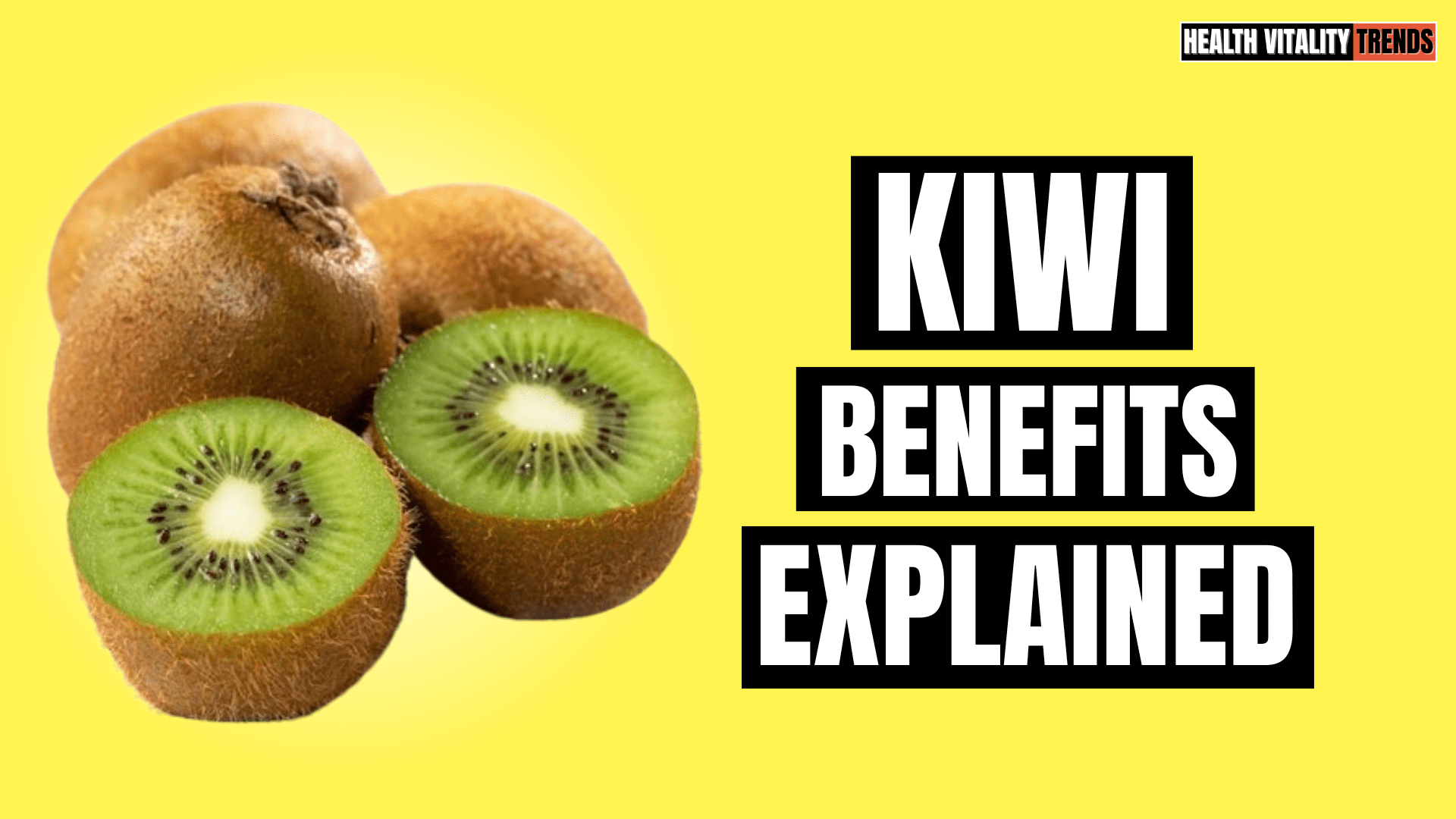
KIWI: Vitamin C, Gut Health & Sleep-Supporting Nutrients Explored
Kiwi, also called the “Chinese gooseberry,” is a small fruit packed with flavor and impressive health benefits.
Yes, despite its fuzzy brown skin appearance, the vibrant green (or sometimes golden) flesh is both sweet and tangy.
Beyond its refreshing taste, kiwi is a nutrient powerhouse fruit that is loaded with vitamin C, fiber, and antioxidants. From boosting immunity to aiding digestion, this fruit has earned its superfood status.
Let’s explore everything about kiwi, its nutrition facts, health benefits, storage tips, and more.
What is Kiwi?
Kiwi is a highly nutrient-dense fruit, definitely. It is native to China, but also widely cultivated in New Zealand, Italy, and other countries.
The most common variety has a fuzzy brown skin with bright green flesh and tiny black seeds in it. Other kiwi types, like golden kiwi, have smooth skin and a much more sweeter taste.
Kiwi has been cherished both as a snack and as a health remedy. In traditional Chinese medicine, it was used to aid digestion and strengthen immunity.
Today, it’s a popular recipe ingredient in smoothies, salads, desserts, and juices.
What Does Kiwi Taste Like?
Kiwi has a unique flavor profile, which is a balance between sweet and tangy.
The green flesh is juicy and refreshing, somewhat similar to a blend of strawberry, pineapple, and citrus. Golden kiwis are less tart, but taste more sweeter.
When ripe, the fruit is soft to the touch, while unripe kiwis are stiff and sour in taste. Many people eat it raw, but it also pairs well with yogurt, oats, and even grilled meats.

Kiwi Nutrition Facts
Here’s the nutrition breakdown for 1 medium kiwi (about 69 g) according to the USDA[1]:
| Nutrient | Amount |
|---|---|
| Calories | 42 |
| Carbohydrates | 10.1 g |
| Fiber | 2.1 g |
| Sugars | 6.2 g |
| Protein | 0.8 g |
| Fat | 0.4 g |
| Vitamin C | 71 mg (79% DV) |
| Vitamin K | 27.8 mcg (23% DV) |
| Folate | 17 mcg |
| Potassium | 215 mg |
| Vitamin E | 1.0 mg |
Explanation: Kiwi is low in calories but rich in essential vitamins and minerals. Its vitamin C content is even higher than that of oranges, making it an excellent fruit for immune health. It also provides fiber for digestion, potassium for heart health, and antioxidants that fight free radical damage.
Health Benefits of Kiwi
1. Boosts Immunity
With nearly 80% of the daily vitamin C requirement in one fruit, kiwi strengthens the immune system and helps prevent infections. (PubMed)[2].
2. Supports Heart Health
Kiwi is high in potassium, which helps to regulate blood pressure effectively. Studies show that eating 2–3 kiwis daily may reduce blood clotting and improve cholesterol levels. (ScienceDirect)[3].
3. Improves Digestion
Kiwi contains actinidin, a natural enzyme that aids in the digestion of protein nutrients. Its fiber content also supports bowel regularity and gut health. (ScienceDirect)[4].
4. Promotes Skin Health
The vitamin C and antioxidants in kiwi help collagen production, protecting skin against wrinkles and sun damage.
5. Aids Sleep and Stress Management
Research suggests kiwi consumption before bedtime improves sleep quality due to its serotonin content. (PubMed)[5].
6. Supports Eye Health
Rich in lutein and zeaxanthin, kiwi may protect against age-related macular degeneration. (NIH)
How to eat a Kiwi
- You can directly peel and slice it for a refreshing evening snack.
- Or cut the fruit in half and scoop it with a spoon for a quick bite.
- Add to smoothies, fruit salads, or yogurt bowls.
- Use in desserts like pavlovas, tarts, or sorbets.
- Blend with leafy greens for a nutrient-packed green juice.
Fun fact: The skin is edible too. It adds extra fiber, though its texture may not appeal to everyone.
How to Store Kiwi to Keep It Fresh
- Room Temperature: Keep unripe kiwis at room temperature until they soften.
- Refrigerator: Store ripe kiwis in the fridge for up to 1–2 weeks before they are ripe and ready to eat.
- Freezing: Peel, slice, and freeze kiwi pieces for later use.
- Ripening Tip: Place kiwis in a paper bag with bananas or apples to speed ripening.

Possible Side Effects and Precautions
Side Effects
- Allergic Reactions – Although its rare, nevertheless some people may experience itching, swelling, or rashes after eating kiwi, especially if allergic to latex. (ResearchGate)[6].
- Digestive Issues – Overeating kiwi may cause diarrhea due to its high fiber content.
- Blood Thinning – Kiwi can act as a natural blood thinner, which may interact with anticoagulant medications.
- Oral Irritation – The fruit’s enzymes may cause a tingling sensation in the mouth.
Precautions
- People on blood-thinning medications (like warfarin) should limit excess kiwi intake.
- Those with kidney issues should monitor potassium levels before consuming it frequently.
- Children trying kiwi for the first time should be given small amounts to check for allergies.
- Pregnant women can enjoy kiwi in moderation, but consult a doctor if prone to allergies.
Fruits Similar to Kiwi
- Strawberries – Sweet-tart and high in vitamin C.
- Pineapple – Tropical fruit with digestive enzymes.
- Guava – Rich in fiber and vitamin C.
- Dragon Fruit – Exotic fruit with crunchy seeds and antioxidants.
Common FAQs About Kiwi
1. Can you eat kiwi skin?
Yes, kiwi skin is edible and packed with fiber and antioxidants. Just wash thoroughly before eating.
2. Is kiwi good for weight loss?
Yes, it’s low in calories and high in fiber, making it a filling snack.
3. How many kiwis should I eat a day?
1–2 kiwis daily are enough to gain health benefits without side effects.
4. Is kiwi safe for diabetics?
Yes, kiwi has a low glycemic index (around 50) and can be consumed in moderation by diabetics.
Conclusion
Kiwi is a small fruit with mighty health benefits. It boosts immunity, aids in digestion and improves heart health. Its high vitamin C content, fiber, and unique antioxidants make it a valuable addition to any diet. Whether eaten fresh, blended into smoothies, or enjoyed with the skin on, kiwi is both delicious and nourishing. Adding 1–2 kiwis a day can be a simple step toward better health.
References
- https://snaped.fns.usda.gov/resources/nutrition-education-materials/seasonal-produce-guide/kiwifruit
- https://pubmed.ncbi.nlm.nih.gov/23394995/
- https://www.sciencedirect.com/science/article/abs/pii/B9780123942944000158
- https://www.sciencedirect.com/science/article/abs/pii/B9780123942944000080
- https://pmc.ncbi.nlm.nih.gov/articles/PMC10043399/
- https://www.sciencedirect.com/science/article/abs/pii/B9780123942944000183








